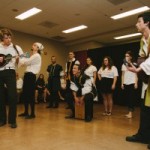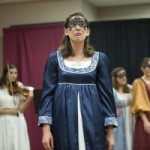A Humble and Rousing Shakespeare at Ave Maria University
/Published by Michael Novak in the Gyrene Gazette on June 11, 2013
 It is too bad the people of Naples were not able to see the humblest (yet stunning) production of MUCH ADO ABOUT NOTHING staged in this area for some time. That was not Naples’ fault. It was the disadvantage of Ave Maria’s very recent founding.
It is too bad the people of Naples were not able to see the humblest (yet stunning) production of MUCH ADO ABOUT NOTHING staged in this area for some time. That was not Naples’ fault. It was the disadvantage of Ave Maria’s very recent founding.
Ave Maria University has no Theater Arts Building. No stage. No drama department. Its production of MUCH ADO was performed for three weekends in April in a large classroom, its seating arranged in a pattern not unlike that of the Blackfriars Theater in Shakespeare’s time. The audience was close up, surrounding the play, part of the play.
This humble setting did not prevent the amazingly talented and energetic cast from presenting a belly-laughing, silence-inducing, and often unforgettably taut three hours of theater. Seldom has a crowd left a Shakespeare theater so exhilarated. (I speak as a veteran lover of some 200-plus performances, in London, New York, and Washington). Many viewers were still speaking of it days afterwards.
The young cast was tutored this semester in a special class by the professionally experienced Shakespeare director, Professor Travis Curtright (www.shakespeareinperformance.net). Despite their youth, the cast gave precise attention to every detail, even their timing for breaths. Not despite but because of much repetition and care in advance, the whole cast were free by second natured to be their spontaneous selves
To be sure, one advantage twenty-somethings have over older professionals is that they are playing characters their own age, with the distinctively tender and fragile feelings, high excitements and crushing blows of that gloriously vulnerable time of life.
Some of the troupe played modern songs before the show and during intermission. They picked songs they found related to Much Ado.
VANESSA TOMPKINS – keep that name alive in your memory. One day soon, expect to see her in local, regional, then national opera (since childhood, opera has been her first love) or musical comedy (hear her sing “My Fair Lady”) – or in an effortlessly romantic role on stage.
Earlier this year, Frank D’Ambrosio, who sang “the Phantom” in The Phantom of the Opera some two thousand times on Broadway, agreed to come back for a second year as main attraction of an Ave fund raiser because, he said, “I will have another chance to sing with Vanessa.” And so he did, brilliantly. Many who had never heard Vanessa sing, said she more than hold her own, even slightly bested the wonderful D’Ambrosio as the richer talent of the two.
Vanessa’s special talent as an actress is that at each moment, the whole intensity of every scene comes slowly to her face. As Beatrice, she evinces the most painful grief at the “dying” of her dear, dear cousin Hero, who falls helpless under an utterly false accusation against her chastity. Then shortly thereafter, Beatrice lets escape the most marvelously radiant love for Benedick, who had until then been her despised partner in brutal, disdainful banter. She immediately covers it over, and resumes her barbs. At the end, she leaps with unsuppressed joy into his arms.
It is wrong to single out Vanessa, for no heroine in theater can ever shine unless the whole cast around her lend their own depth of color and tiniest detail. I doubt if there has ever been a Dogberry, commander of the night watch, of so many sinewy bodily movements, innocently hilarious pronouncements, and laughter-producing moments as Peter Atkinson (veteran of theater since his boyhood). Just to see him plunge his hands into his belt, palms outward, and walk with the oddest walk the stage ever saw made the audience laugh — even before his delightfully abundant malapropisms broke his lips.
Peter’s older brother Charles played in deliciously drawn-out voice, slinky movements, and bounding glee in evil done, the most villainous villain, Don John. The warrior with words – and pursuer of Beatrice– Benedick displayed an astonishingly humorous sense of male ego, conceit, and pleasure in his own prowess in all respects. The most noble nobleman Leonato, shattered father to Hero and uncle to Beatrice, played a role so fatherly, tender, and manly as to comfort the soul that something is right in the human world. At the monument for the ‘dead’ Hero, his sad voice also sang beautifully. And his wife Innogen’s taunt to the slanderer of her daughter, “Come here, boy-yy! I will whip-p you, boy-yy!” was exquisitely uttered.
And what shall be said about the wronged Hero (Sophie Pakaluk), whose maidenly face and girlish joy, as the play opens, turns soon into the most radiant face of love for her passionately appreciative fiancé, Count Claudio, returned as a young hero from the recent war. Before long, however, that haunting and innocent face turns ashen, utterly done-in. For at the very moment when the two lovers kneel at the altar for their betrothal, the self-misled Claudio lashes her with hideously false allegations.
Not often does one see the sheer radiance of a soul so innocent of mind and heart left defenseless and scorned even by her own father. Hero’s inwardly driven collapse into unconsciousness is one of the most gracefully executed faints I ever saw performed.
 Then, too, one dare not overlook the superabundance of talent at Ave Maria, especially among the young women. So rich is the female talent that a full second cast of the lead parts for women took its turn over the three weeks of performances. Each one of the second cast kept the joy of the play alive when her chance came, particularly Leslie Nagel, who played an entirely different Beatrice, to great and moving effect.
Then, too, one dare not overlook the superabundance of talent at Ave Maria, especially among the young women. So rich is the female talent that a full second cast of the lead parts for women took its turn over the three weeks of performances. Each one of the second cast kept the joy of the play alive when her chance came, particularly Leslie Nagel, who played an entirely different Beatrice, to great and moving effect.
Leslie Nagel plays Beatrice’s sharp tongue well in the Masquerade scene.
On this stage, no one lets the team down. Prince Pedro has the quiet dignity, good humor and valor one expects in a Prince, taken in as he is by a deceitful pantomime. He thought he was seeing Hero with a lover at her window the night before the wedding. Later, the brave confession of full responsibility for that deceit by the servant who for a mere thousand ducats betrayed fair Hero to her death, brings a breath of nobility to his character. Moreover, just at the moment when all seemed bleakest, the good Friar by his quiet wisdom, peaceful manner, and clever reasoning set in motion the total vindication of Hero.
It was an evening to remember for a long time, a down-to-earth, unpretentious Shakespeare that seemed just as it must have seemed four hundred years ago at Blackfriars priory. It spared its audience hardly a moment without laughter, then black sorrow, and a joyously rousing conclusion.
It makes one cry that the whole city of Naples could not see this performance (although some local high schoolers did get a chance one evening, and may have been the best and most responsive audience of all).
Ave badly needs a theater worthy of its talent and joy.
